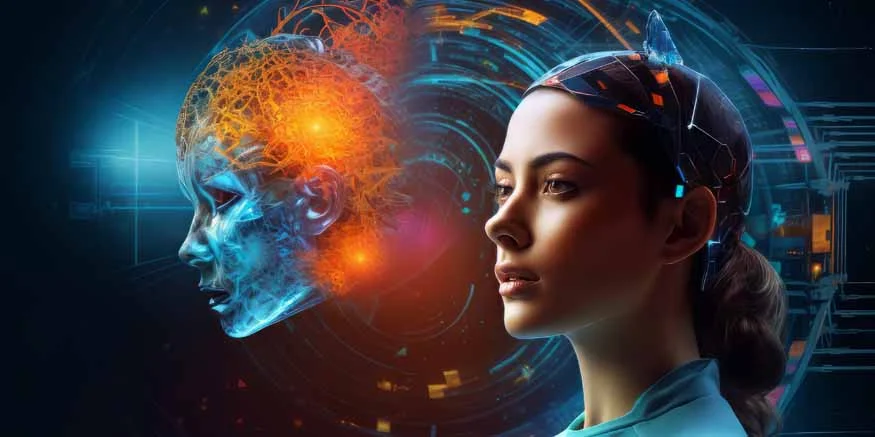In recent years, mental health has gained significant attention as issues such as anxiety, depression, and burnout continue to affect millions globally. Simultaneously, the rapid evolution of Artificial Intelligence (AI) offers new possibilities for addressing challenges in healthcare. The convergence of mental health and AI presents innovative solutions that can revolutionize how we understand, diagnose, and treat mental health disorders.
This blog explores the fascinating intersection between mental health and AI, highlighting its applications, benefits, and ethical considerations in transforming mental health care.
The Growing Mental Health Crisis
Mental health issues have become a global epidemic. According to the WHO’s World Mental Health Report (2022), nearly one billion people—about 12.5% of the global population—are affected by a mental health condition. Depression and anxiety are leading causes of disability worldwide, exacerbated by stress, social isolation, and the impact of the COVID-19 pandemic.
Despite the rising demand for mental health services, access to quality care remains limited due to shortages of professionals, long waiting times, and high costs. This is where AI offers a pivotal role, providing scalable, accessible, and personalized solutions.
How AI is Revolutionizing Mental Health Care
AI is already making significant strides in healthcare, and mental health care is no exception. Below are some promising applications of AI in mental health care:
AI-Powered Mental Health Chatbots
AI-driven chatbots, such as Woebot and Wysa, provide emotional support and guidance through simulated conversations. Using natural language processing (NLP), these virtual assistants engage users, monitor their emotional state, and offer coping strategies based on cognitive-behavioural therapy (CBT). While chatbots cannot replace professional therapy, they offer 24/7 support, making mental health care more accessible and affordable.
AI in Early Detection and Diagnosis
AI’s ability to analyse large datasets makes it ideal for early detection of mental health disorders. Machine learning algorithms can assess social media activity, voice patterns, and wearable device data to detect early signs of mental health issues. For instance, AI can identify depressive speech patterns or track physiological signals like heart rate and sleep patterns, alerting users to potential concerns before symptoms worsen.
Personalized Mental Health Treatment Plans
AI is enabling more personalized treatment options. By analysing a patient’s history, genetics, and environment, AI can recommend tailored treatment plans that may include therapy, medication, or lifestyle changes. This personalized approach, which evolves with the patient’s needs, can lead to better outcomes than traditional one-size-fits-all methods.
AI in Virtual Reality (VR) Therapy
AI-enhanced VR therapy is proving effective for treating anxiety disorders, phobias, and PTSD. Immersing patients in computer-generated environments, AI adapts the experience based on their emotional responses, offering personalized, immersive therapy sessions that help manage these conditions in a controlled setting.
The Benefits of AI in Mental Health Care
AI in mental health offers several key advantages:
- Increased Accessibility: AI tools can provide mental health support to those who face barriers such as geographic isolation, financial constraints, or social stigma.
- Cost-Effectiveness: AI tools are often more affordable than traditional therapy, making mental health care more accessible to a larger population.
- Scalability: AI can reach millions simultaneously, alleviating the strain on overburdened healthcare systems.
- Early Intervention: AI can detect mental health issues early, before symptoms become severe, increasing the likelihood of successful treatment.
Ethical Considerations and Challenges
Despite its potential, AI in mental health raises several ethical concerns:
Data Privacy and Security
Mental health data is highly sensitive, and users must trust that their personal information is secure. AI systems rely on large datasets, which raises concerns about how this data is collected, stored, and used. Developers must prioritize data security and comply with privacy regulations to build trust.
Bias and Fairness
AI algorithms are only as good as the data they are trained on. If the data is biased, the AI’s recommendations may also be skewed, potentially leading to misdiagnosis or inappropriate treatment, particularly for minority or underrepresented groups. Ensuring diverse training datasets is crucial for equitable care.
Human Oversight
AI tools should complement, not replace, human mental health professionals. Over-reliance on AI could risk dehumanizing care or misinterpreting symptoms that require human judgement. Human oversight remains essential in providing compassionate, effective mental health care.
Conclusion
The integration of AI into mental health care offers exciting possibilities, from chatbots providing emotional support to AI-driven diagnostics and personalized treatment plans. While these innovations promise to improve mental health outcomes, they must be balanced with ethical considerations such as data privacy, fairness, and the ongoing need for human oversight.
With responsible development, AI has the potential to revolutionize mental health care, making quality support more accessible, affordable, and personalized for people around the world.









